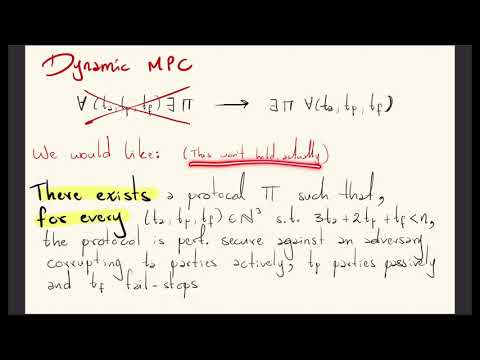CryptoDB
Information-Theoretically Secure MPC against Mixed Dynamic Adversaries
| Authors: | |
|---|---|
| Download: | |
| Abstract: | In this work we consider information-theoretically secure MPC against an \emph{mixed} adversary who can corrupt $t_p$ parties passively, $t_a$ parties actively, and can make $t_f$ parties fail-stop. With perfect security, it is known that every function can be computed securely if and only if $3t_a + 2t_p + t_f < n$, for statistical security the bound is $2t_a + 2t_p + t_f < n$. These results say that for each given set of parameters $(t_a, t_p, t_f)$ respecting the inequality, there exists a protocol secure against this particular choice of corruption thresholds. In this work we consider a \emph{dynamic} adversary. Here, the goal is a \emph{single} protocol that is secure, no matter which set of corruption thresholds $(t_a, t_p, t_f)$ from a certain class is chosen by the adversary. A dynamic adversary can choose a corruption strategy after seeing the protocol and so is much stronger than a standard adversary. Dynamically secure protocols have been considered before for computational security. Also the information theoretic case has been studied, but only considering non-threshold adversaries, leading to inefficient protocols. We consider threshold dynamic adversaries and information theoretic security. For statistical security we show that efficient dynamic secure function evaluation (SFE) is possible if and only if $2t_a + 2t_p + t_f < n$, but any dynamically secure protocol must use $\Omega(n)$ rounds, even if only fairness is required. Further, general reactive MPC is possible if we assume in addition that $2t_a+2t_f \leq n$, but fair reactive MPC only requires $2t_a + 2t_p + t_f < n$. For perfect security we show that both dynamic SFE and verifiable secret sharing (VSS) are impossible if we only assume $3t_a + 2t_p + t_f < n$ and remain impossible even if we also assume $t_f=0$. In fact even SFE with security with abort is impossible in this case. On the other hand, perfect dynamic SFE with guaranteed output delivery (G.O.D.) is possible when either $t_p = 0$ or $t_a = 0$ i.e. if instead we assume $3t_a+t_f < n$ or $2t_p +t_f < n$. Further, perfect dynamic VSS with G.O.D. is possible under the stronger conditions $3t_a + 3/2t_f \leq n$ or $2t_p + 2t_f \leq n$. These conditions are also sufficient for perfect reactive MPC. On the other hand, because perfect fair VSS only requires $3t_a+2t_p+t_f< n$, perfect reactive MPC is possible whenever perfect SFE is. |
Video from TCC 2021
BibTeX
@article{tcc-2021-31503,
title={Information-Theoretically Secure MPC against Mixed Dynamic Adversaries},
booktitle={Theory of Cryptography;19th International Conference},
publisher={Springer},
doi={10.1007/978-3-030-90459-3_20},
author={Ivan Damgård and Daniel Escudero and Divya Ravi},
year=2021
}

